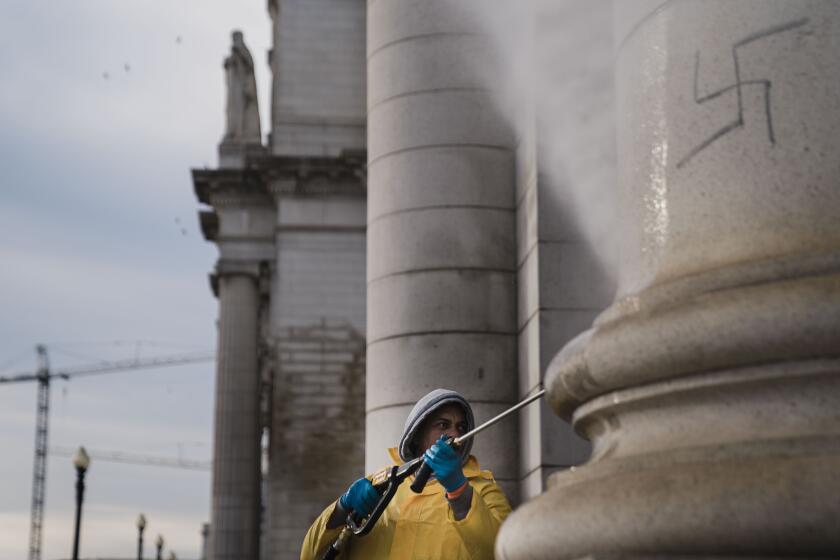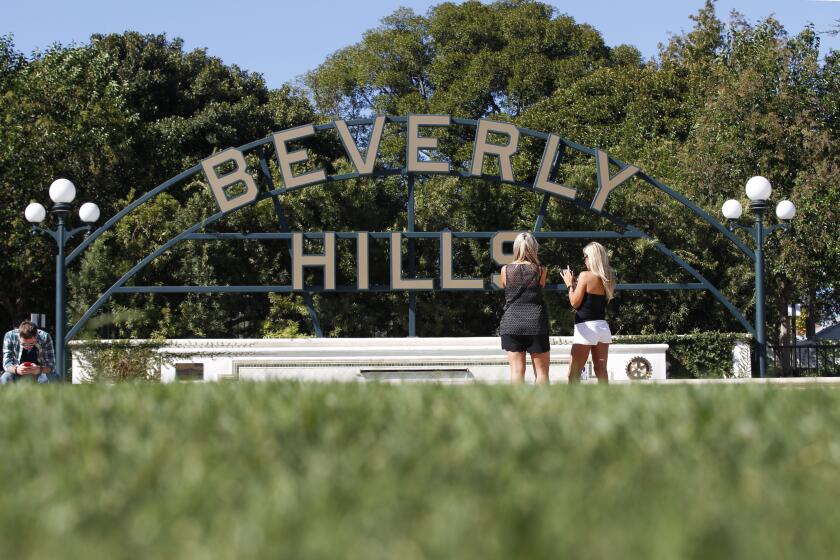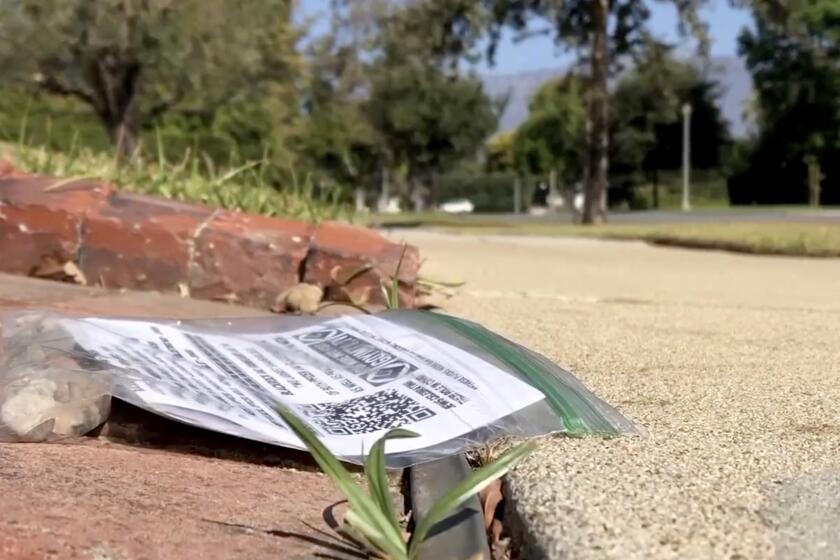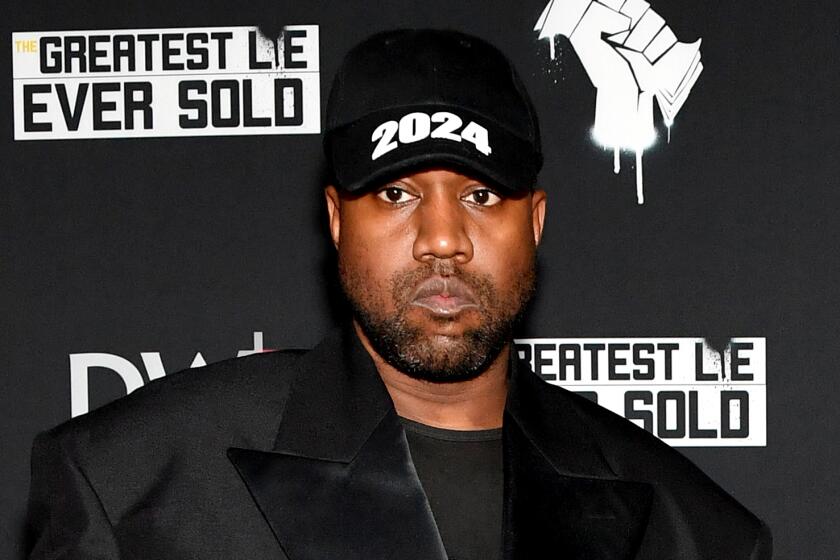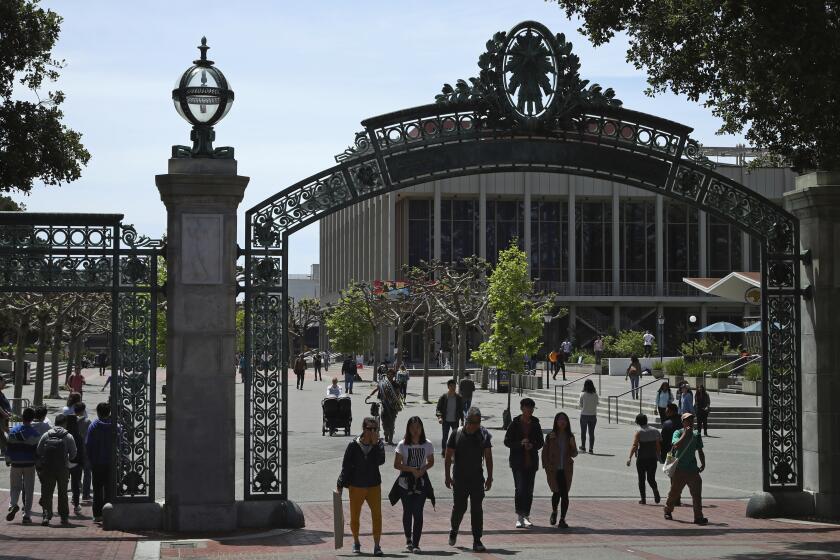‘We’re forever changed’: A year after hostage ordeal, a Texas synagogue copes with trauma
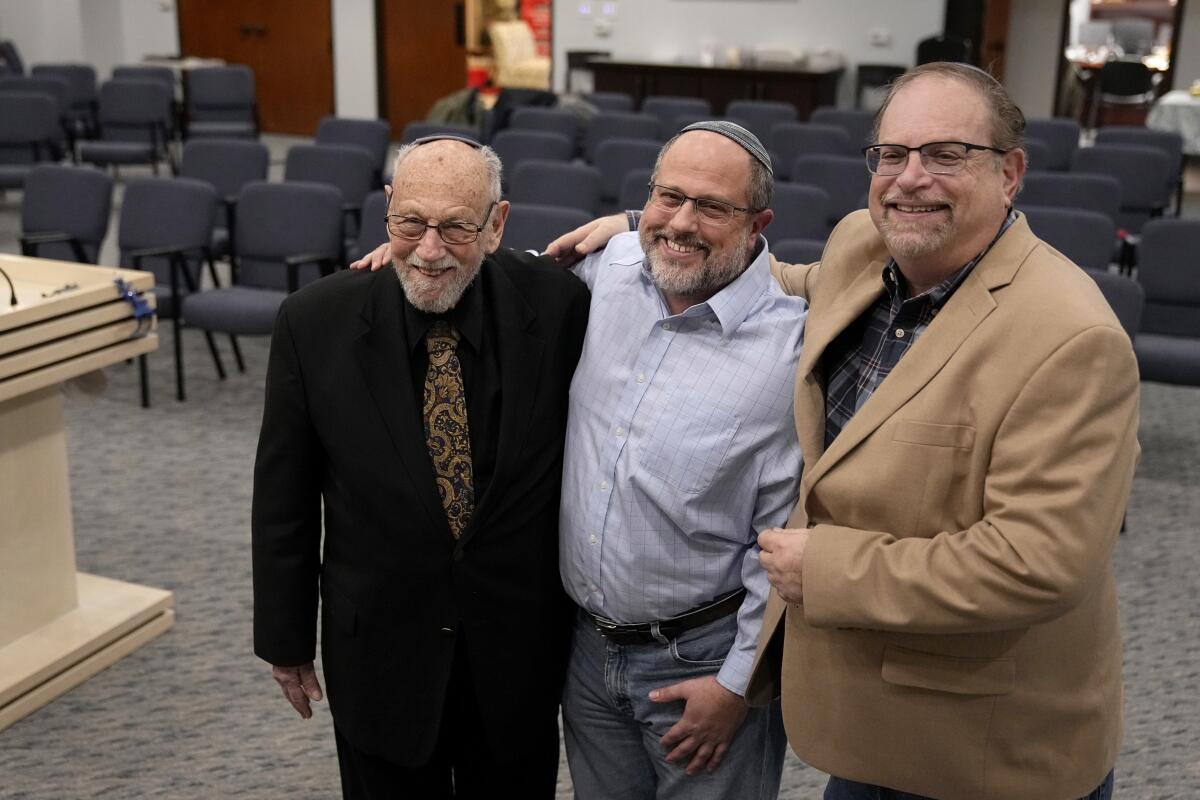
COLLEYVILLE, Texas — A year ago, Jeff Cohen and three others survived a hostage standoff at their Reform Jewish synagogue in this Fort Worth suburb.
Their trauma did not disappear, though, with the FBI’s killing of their pistol-wielding captor, 44-year-old British national Malik Faisal Akram.
Healing from the Jan. 15, 2022, ordeal remains an ongoing process.
“Let’s be blunt: We’re healing. We’re not healed,” said Cohen, 58, a Lockheed Martin engineer who serves as president of Congregation Beth Israel and its 140-family membership.
The 10-hour standoff ended about 9 p.m. that Saturday as the remaining hostages — including Cohen — escaped and the FBI’s tactical team gunned down Akram.
The violence left the synagogue with broken doors and windows, shattered glass and bullet holes. Within three months, repairs had been made and the congregation returned. But one year later, deep wounds still fester.
Expressions of antisemitism have grown louder in recent years. Researchers say that rising U.S. antisemitism is increasingly translating into workplace discrimination.
“We have a lot of people who are still feeling it bad,” Cohen said as two fellow hostages, Lawrence Schwartz and Shane Woodward, nodded in a group interview at the synagogue. “We have parents who aren’t very comfortable bringing their kids to Sunday school.
“We’re forever changed,” he added. “We’ve had to get used to having security here all the time.”
The recent surge in antisemitic rhetoric and incidents nationally has intensified both the congregation’s trauma and its resolve to move forward without fear, said Anna Salton Eisen, a founder of the synagogue and author of books about her parents’ survival of the Holocaust.
“After the hostage crisis, I’m inspired to go out and try to use this, along with the Holocaust, as an inspiration to fight hate,” Eisen said.
Kanye West was dropped by Adidas and his talent agency, after ‘brazen’ and ‘unapologetic’ antisemitic rhetoric.
It all started with a knock at the door. On a cold, windy Saturday, a man who appeared homeless showed up outside Beth Israel.
The stranger immediately unsettled Schwartz, 87, who was helping Rabbi Charlie Cytron-Walker prepare for the morning Shabbat service.
“I said, ‘I don’t like this,’” recalled Schwartz, a retired accountant, who helped lead security for his previous synagogue. “I said, ‘Charlie, don’t open the door.’ He went ahead and opened it.”
The temperature hovered near freezing and the wind made it feel even colder. Cytron-Walker showed the stranger compassion — as his Jewish faith calls him to do — and invited Akram inside. They chatted and the rabbi made him tea.
Some GOP leaders this week denounced Trump’s dinner with Ye and Nick Fuentes. Others continued to try to excuse him. The party is paying a price for that.
Akram had spent time in Dallas-area homeless shelters, but the cold wasn’t why he wanted to come into the synagogue.
“I had no indication that he was intending to do us harm until I heard the click of a gun, which was an hour after I met him,” said Cytron-Walker, 47, who had served at Beth Israel for 16 years. That click came about 11 a.m. as Cytron-Walker prayed facing the front of the sanctuary.
The weather and the COVID-19 pandemic made for a light in-person crowd that day. While an unknown number watched online, just three besides the rabbi came in person: Cohen, Schwartz and Woodward, who arrived a few minutes late.
Start your day right
Sign up for Essential California for the L.A. Times biggest news, features and recommendations in your inbox six days a week.
You may occasionally receive promotional content from the Los Angeles Times.
Woodward, 47, listened to the first part of the service via Zoom on his drive to the synagogue. He heard Cytron-Walker mention the guest. After arriving and taking a seat, Woodward noticed Akram.
“I did hear a lot of fidgeting going on. He was kind of rustling around back there,” Woodward said. “I waved to him, and he was very polite. He waved back. He smiled, nodded. … We were in the middle of praying when it happened.”
During the standoff, Akram demanded the release of a Pakistani woman serving a lengthy prison sentence in Fort Worth after being convicted of trying to kill U.S. troops.
Antisemitic markings on buildings and houses and schools have cropped up over the years in Los Angeles. This is never OK and must be called out every time.
The hostages said Akram cited antisemitic stereotypes, believing that Jews wield the kind of power that could get the woman released.
“At CBI with a gunman,” Cohen posted on Facebook. “If I don’t get out, remember me. Fight hate.”
Schwartz apparently reminded Akram of his father, and the gunman started calling him “Dad.”
At one point, he got his captor’s permission to use the restroom. “He said, ‘I’ll let you go, but if you don’t come back, I’m going to kill these three guys,’” Schwartz said.
A 47-year-old Texas man was arrested on suspicion of felony vandalism and a hate crime. He is being held on $20,000 bail, Los Angeles County jail records showed.
About six hours into the standoff, his fellow hostages told Schwartz, who has hearing problems, to leave. He didn’t understand at first. But they had talked Akram into releasing him.
Initially, Schwartz was upset. He didn’t want to leave them behind, but later realized they stood a better chance without him.
“I’m not able to move very fast,” Schwartz said. “They could run. But not me.”
Woodward grew up Baptist but was in the process of converting to Judaism. As the standoff dragged on, he remarked, “Rabbi, I’m still converting.”
Fliers with antisemitic messages were left near homes, apparently at random, in San Marino and Pasadena, police said.
“There is no guarantee that we were getting out of there, and this is what was going through his mind,” Cytron-Walker said with a chuckle. “Jeff turned around and said, ‘What?’ Since we all got out, it’s really one of the humorous moments.”
Hours later, Akram was becoming more agitated.
The hostages’ fears that he would shoot them increased.
“He was yelling at the negotiator, and when he hung up, he got really calm,” Cytron-Walker said. “He turned to us, and I thought that we were going to die. He asked us for some juice.”
Some pastors and members of the Christian community have been hesitant to publicly admonish him. Others feel compelled to speak out.
After Cytron-Walker walked to the kitchen, Akram decided he wanted a soda instead. The rabbi returned with a can of soda and a plastic cup.
That’s when the chance to escape came.
“He was holding on to the liquid with one hand,” Cytron-Walker said. “For the first time all day, he did not have his hand on the trigger.”
The rabbi yelled, “Run!” and threw a chair at Akram. They escaped through a side door.
Times columnists Erika D. Smith and Anita Chabria take a look ahead after a year that brought multicultural extremism and hate into the public eye.
Simultaneously and unknown to the hostages, the FBI team entered the building to attempt a rescue. Like the rabbi, the authorities were concerned about Akram’s state of mind.
The hostages say Akram attempted to shoot at them as they ran but that his pistol misfired.
“I know God was with us,” Woodward said.
Before the standoff, Cytron-Walker had already interviewed for a new job as rabbi at Temple Emanuel in Winston-Salem, N.C. The hostage crisis delayed that process, but he started his new job in July.
Breaking News
Get breaking news, investigations, analysis and more signature journalism from the Los Angeles Times in your inbox.
You may occasionally receive promotional content from the Los Angeles Times.
Even 1,100 miles away, “the events of Jan. 15 continue to impact almost every aspect of my life,” he said.
From his sermon topics to his speaking engagements on antisemitism to his recent opportunity to light the menorah at the White House’s Hanukkah reception, the hostage crisis figures heavily, Cytron-Walker said.
“I’m not having nightmares or anything that would resemble PTSD,” he said. “I never know if that could come up at some point in time, but I’m very thankful that it hasn’t as of yet.”
A year later, the hostages urge other houses of worship to take security training seriously. Cytron-Walker credits it with getting out safely.
The federal complaint accuses UC Berkeley of an ‘act of discrimination against the Jewish community’ and equates anti-Zionism, which challenges the state of Israel, with antisemitism.
But next time, Schwartz said, he would act on his concern and call 911.
“I don’t care if the congregation wants to throw me out. I don’t care if the rabbi never wants to talk to me again,” said Schwartz, who now wears a custom-made yarmulke with the message “Stronger Than Hate” on it. “I should have operated on my thoughts, and I didn’t.”
But Cytron-Walker said he does not regret abiding by his faith.
“He looked like he was a homeless man, and I continue to live with the fact that I was fooled,” he said. “We have to be able to live our values even when they’re hard.”
More to Read
Sign up for Essential California
The most important California stories and recommendations in your inbox every morning.
You may occasionally receive promotional content from the Los Angeles Times.
